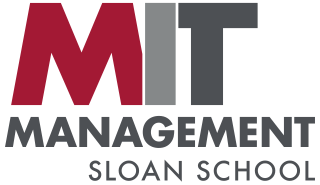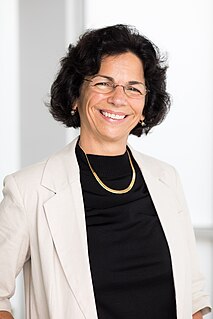Register or registration may refer to:

In business theory, disruptive innovation is innovation that creates a new market and value network or enters at the bottom of an existing market and eventually displaces established market-leading firms, products, and alliances. The concept was developed by the American academic Clayton Christensen and his collaborators beginning in 1995, and has been called the most influential business idea of the early 21st century. Lingfei Wu, Dashun Wang, and James A. Evans generalized this term to identify disruptive science and technological advances from more than 65 million papers, patents and software products that span the period 1954–2014. Their work was featured as the cover of the February 2019 issue of Nature and was selected as the Altmetric 100 most-discussed work in 2019.

Innovation is the practical implementation of ideas that result in the introduction of new goods or services or improvement in offering goods or services. ISO TC 279 in the standard ISO 56000:2020 defines innovation as "a new or changed entity realizing or redistributing value". Others have different definitions; a common element in the definitions is a focus on newness, improvement, and spread of ideas or technologies.
In business and engineering, new product development (NPD) covers the complete process of bringing a new product to market, renewing an existing product or introducing a product in a new market. A central aspect of NPD is product design, along with various business considerations. New product development is described broadly as the transformation of a market opportunity into a product available for sale. The products developed by an organisation provide the means for it to generate income. For many technology-intensive firms their approach is based on exploiting technological innovation in a rapidly changing market.

The MIT Sloan School of Management is the business school of the Massachusetts Institute of Technology, a private university in Cambridge, Massachusetts. MIT Sloan offers bachelor's, master's, and doctoral degree programs, as well as executive education. Its degree programs are among the most selective in the world. MIT Sloan emphasizes innovation in practice and research. Many influential ideas in management and finance originated at the school, including the Black–Scholes model, the Solow–Swan model, the random walk hypothesis, the binomial options pricing model, and the field of system dynamics. The faculty has included numerous Nobel laureates in economics and John Bates Clark Medal winners.
Technology transfer (TT), also called transfer of technology (TOT), is the process of transferring (disseminating) technology from the person or organization that owns or holds it to another person or organization, in an attempt to transform inventions and scientific outcomes into new products and services that benefit society. Technology transfer is closely related to knowledge transfer.
Open innovation is a term used to promote an information age mindset toward innovation that runs counter to the secrecy and silo mentality of traditional corporate research labs. The benefits and driving forces behind increased openness have been noted and discussed as far back as the 1960s, especially as it pertains to interfirm cooperation in R&D. Use of the term 'open innovation' in reference to the increasing embrace of external cooperation in a complex world has been promoted in particular by Henry Chesbrough, adjunct professor and faculty director of the Center for Open Innovation of the Haas School of Business at the University of California, and Maire Tecnimont Chair of Open Innovation at Luiss.

Design management is a field of inquiry that uses project management, design, strategy, and supply chain techniques to control a creative process, support a culture of creativity, and build a structure and organization for design. The objective of design management is to develop and maintain an efficient business environment in which an organization can achieve its strategic and mission goals through design. Design management is a comprehensive activity at all levels of business, from the discovery phase to the execution phase. "Simply put, design management is the business side of design. Design management encompasses the ongoing processes, business decisions, and strategies that enable innovation and create effectively-designed products, services, communications, environments, and brands that enhance our quality of life and provide organizational success." The discipline of design management overlaps with marketing management, operations management, and strategic management.

Tomsk State University of Control Systems and Radioelectronics is a public university in Tomsk, Russia. Founded in 1962, TUSUR University was formed when two faculties, the Faculty of Radio Engineering and the Faculty of Electric Radio Control, split from Tomsk Polytechnic University to create a new educational institution. The mission of TUSUR as an entrepreneurial research university is “to create cultural, educational, research and innovative environment, ensuring achievement of success by alumni whose labor and knowledge guarantee that high technologies serve the country, society and the world”.
Collaborative innovation is a process in which multiple players contribute towards creating new products with customers and suppliers.
The URBAN AND REGIONAL INNOVATION Research (URENIO) is a university lab in the Department of Urban and Regional Planning, School of Engineering at the Aristotle University of Thessaloniki. URENIO is a non-profit research organization that started its operation in 1995. URENIO is mainly involved in competitive projects from the European R&D Framework Programs (FP), the Competitiveness and Innovation Program (CIP), the territorial cooperation programs, the OECD, and the United Nations.
Technology Intelligence (TI) is an activity that enables companies to identify the technological opportunities and threats that could affect the future growth and survival of their business. It aims to capture and disseminate the technological information needed for strategic planning and decision making. As technology life cycles shorten and business become more globalized having effective TI capabilities is becoming increasingly important.
Innovation economics is new and growing field of economic theory and applied and experimental economics that emphasizes innovation and entrepreneurship. It comprises both the application of any type of innovations, especially technological, but not only, into economic use, in classical economics this is the application of customer new technology into economic use; but also it could refer to the field of innovation and experimental economics that refers the new economic science developments that may be considered innovative. In his 1942 book Capitalism, Socialism and Democracy, economist Joseph Schumpeter introduced the notion of an innovation economy. He argued that evolving institutions, entrepreneurs and technological changes were at the heart of economic growth. However, it is only in recent years that "innovation economy," grounded in Schumpeter's ideas, has become a mainstream concept".

Gina Colarelli O'Connor is Professor of Innovation Management at Institut Universitaire de France, where she has worked since January 2019. She leads Babson's executive education programs in corporate innovation.

Vivek Wadhwa is an American technology entrepreneur and academic. He is Distinguished Fellow & Adjunct Professor at Carnegie Mellon's School of Engineering at Silicon Valley and Distinguished Fellow at the Labor and Worklife Program at Harvard Law School. He is also author of books Your Happiness Was Hacked: Why Tech Is Winning the Battle to Control Your Brain—and How to Fight Back, Driver in the Driverless Car,Innovating Women: The Changing Face of Technology, and Immigrant Exodus.

The Skolkovo Innovation Center is a high technology business area at Mozhaysky District in Moscow, Russia. Although historically Russia has been successful with development of science and technology, its lack of entrepreneurial spirit led to government intervention in patents and the limitation of Russian tech companies within regional operations.
Communities that support innovation have been referred to as communities of innovation (CoI), communities for innovation, innovation communities, open innovation communities, and communities of creation.

Technion International (TI) is the international department of Technion-Israel Institute of Technology, which was ranked as the best university in Israel and the Middle East. Located in Haifa, Israel, Technion International was founded in 2009 in order to oversee Technion’s international academic endeavors. Technion International offers a variety of programs, including "full undergraduate and graduate programs, postdoctoral fellowships, study abroad programs, summer programs for gifted teens, research internships as well as entrepreneurship programs". As of 2018, "Technion has academic collaboration agreements with 232 universities in 41 countries and 36 medical school agreements".

Information technology (IT) is the use of computers to create, process, store, retrieve, and exchange all kinds of data and information. IT forms part of information and communications technology (ICT). An information technology system is generally an information system, a communications system, or, more specifically speaking, a computer system — including all hardware, software, and peripheral equipment — operated by a limited group of IT users.
Yossi Dashti (born in 1952) is an Israeli-American author, researcher, and business facilitator, in the field of computer information systems, innovation and entrepreneurship. In his books and publications, he promotes value creation and process improvements, while integrating academic research and practical technology innovation business experience. In his early career, Dr. Dashti was engaged with Information Technology (IT) and software applications and was among the pioneers in the development of Electronic Data Interchange (EDI) and E-Commerce platforms. Since 2008, he has been actively promoting China-Israel collaboration in academia and industry, teaching in several universities and setting technology transfer in the two countries. His engagements and contribution to the China Israel relationship are presented and exemplified in his book titled “Jewish Principals, Innovation and Entrepreneurship – China-Israel Collaboration Opportunities”. Dr. Dashti has also been involved in social activities, mainly in the field of education, serving as a board member of several associations.









